ONE of the commonly used phrases in the current battle to contain the global coronavirus pandemic is “flattening the curve”.
It is only when the rising curve in the number of people infected with Covid-19 can be flattened that the pandemic is deemed to be brought under control.
I can’t resist using this same phrase for Malaysia’s already half-a-century old institutionalised anti-corruption fight when thinking we are still nowhere near breaking the backbone of this scourge.
In fact, the index, whether the perception or realistic level, on corruption in the country is still staggering and the battle is seemingly an unwinnable one.
So much has been and is being done to curb this so-called world’s oldest profession. Even the entity tasked with the anti-corruption agenda has undergone four name changes.
Some 52 years ago, it was first known as Anti-Corruption Agency, then it changed to National Bureau of Investigation before returning to its original Anti-Corruption Agency.
And in 2009, it was upgraded to the Malaysian Anti-Corruption Commission (MACC) to further boost its efficiency and effectiveness as well as to drive home the message that “corruption doesn’t pay”.
MACC’s latest successes include asset recovery worth US$1 billion from the 1MDB-related scandals, thanks to close support from the US Department of Justice (DoJ).
As the DoJ is expected to close in on more of such ill-gotten money parked in US banks, several more billions can be expected to be recovered and repatriated to Malaysia.
On the local front, there is a need to reset our anti-corruption key performance indicators from the robust enforcement seen from so many arrests and prosecutions of those allegedly involved in corrupt practices, to the critical sphere of the big P - Prevention.
I am of the view that the bigger mandate in the war against corruption is prevention because only when a nation is successful in preventing bribery or corrupt practices from being a norm that it can hope to flatten the curve. Of course, this is easier said than done.
In this regard, a landmark legislation in prevention came into force last month with the new Section 17A of the MACC Act 2009 that imposes criminal liability on commercial organisations if proven that they failed to prevent corruption.
It is an open secret this new legislation has struck fear down the spines of top management and boards of directors of companies as it is now incumbent upon them to ensure a corruption-free environment in their wheelings and dealings.
On the plus side, the optimists within the private sector see this new legislation as a strong defence mechanism for them to refuse to give bribe or commission whenever such a demand is made by those with the power to approve deals such as tenders for projects or government procurements.
Datuk Seri Akhbar Satar, one of our most prominent anti-corruption activists, has called for a matching legislation akin to Section 17A of the MACC Act to cover corrupt civil servants and politicians to address misconduct that results in financial losses of taxpayers’ money as regularly highlighted in the annual Auditor-General’s Report.
He has proposed the introduction of Misconduct of Public Office provision in the MACC Act to check losses due to negligence and non-compliance with requirements or procedures in government departments and ministries.
“Each year, the Auditor-General’s Report reveals a litany of malpractices among government departments and agencies, some of which were outrageous, for which those public servants should be charged with criminal offences instead of facing merely disciplinary action under the internal rules applicable to them,” said Akhbar, who is president of the Malaysia Association of Certified Fraud Examiners.
On Tuesday, Auditor-General Datuk Nik Azman Nik Abdul Majid lamented that certain government departments only dished out light punishment for such wrongdoings that resulted in massive leakages and losses of funds.
Between 2012 and 2018, 255 civil servants had action taken against them, including being charged in court and sackings after investigations were carried out on discrepancies and questionable actions found by the National Audit Department.
In all, some 1,000 civil servants were investigated.
It is understood the MACC is working towards a new law to criminalise such wrongdoings by civil servants as well. Akhbar described government procurement as a “corruption hotspot”.
In 2018, the Malaysian government spent a whopping RM220.9 billion on assets and services.
With huge amounts of public funds being channelled into the market via public procurement, the procurement process continues to be vulnerable to fraud and corruption.
Former auditor-general Tan Sri Ambrin Buang estimated up to 30% of Malaysia’s public project allocations have been lost to mismanagement and corruption.
Just consider the amount of savings the government would have achieved if it had paid 30% less for goods and services.
All these leakages were actually discovered by the Audit Department only through random checks as it doesn’t have the manpower to go through all of the hundreds of departments, and agencies and their branches.
Imagine the scope and scale of the losses if all were accounted for.
According to Akhbar, government departments are only using 55% of contracts by the e-procurement process and the balance 45% is still by way of conventional procurement where contractors and vendors take advantage of the weak system to reap huge profits by working in cahoots with officials in the Contract Divisions of government entities.
In Indonesia, for example, details of government procurement and tenders for projects are posted online in the interest of transparency and to prevent corruption.
“It is necessary for the government to impose e-procurement for public tenders.
“All transmission of requests for participation and submission of tenders must be done through electronic means to prevent fraud,” added Akhbar.
During these past few months of the movement control order to deal with Covid-19, many might assume that corruption was taking a back seat.
It is not. The MACC has reportedly seen a spike in corruption cases and these could be attributed, among other things, to tens of billions of ringgit being allocated for procurement to deal with the pandemic.
Just last week, a high-ranking Armed Forces officer was detained by the MACC over allegations of receiving a RM500,000 bribe in another procurement case.
It is connected with the arrest of the political secretary of former defence minister Mohamad Sabu in the MACC probe into a direct negotiation contract at the Defence Ministry worth over RM56 million.
Plenty of calls have been made over the years by anti-corruption activists for an end, once and for all, to direct negotiations, better known as “direct nego” deals by the Malaysian government in favour of the open tender system, but all have fallen on deaf ears.
The time for the political will to be imposed for what I call “Direct Nego Must Go” is now before it’s too late.
We all know nations labelled as failed states are mainly due to failure to keep corruption at bay.
The intensity and commitment that nations, including ours, have displayed in fighting this pandemic should also be refllected in anti-corruption, especially in Malaysia’s case, prevention at the procurement front where malpractices are all too rampant.
To all intents and purposes a pandemic of corruption is a larger threat to a nation’s survival than Covid-19.
Comments: letters@thesundaily.com
















